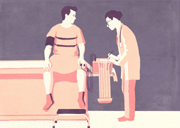HAUPTMENÜ
AWARDS
Forschergeist gefragt: 14. Novartis Oppenheim-Förderpreis für MS-Forschung ausgelobt
FernstudiumCheck Award: Deutschlands beliebteste Fernhochschule bleibt die SRH Fernhochschule
Vergabe der Wissenschaftspreise der Deutschen Hochdruckliga und der Deutschen Hypertoniestiftung
Den Patientenwillen auf der Intensivstation im Blick: Dr. Anna-Henrikje Seidlein…
Wissenschaft mit Auszeichnung: Herausragende Nachwuchsforscher auf der Jahrestagung der Deutschen…
VERANSTALTUNGEN
Wichtigster Kongress für Lungen- und Beatmungsmedizin ist erfolgreich gestartet
Virtuelle DGHO-Frühjahrstagungsreihe am 22.03. / 29.03. / 26.04.2023: Herausforderungen in…
Pneumologie-Kongress vom 29. März bis 1. April im Congress Center…
Die Hot Topics der Hirnforschung auf dem DGKN-Kongress für Klinische…
Deutscher Schmerz- und Palliativtag 2023 startet am 14.3.
DOC-CHECK LOGIN
Fear of being judged and embarrassed are among the reasons
Why patients lie to their doctors
Salt Lake City, Utah, USA (November 30, 2018) – When your doctor asks how often you exercise, do you give her an honest answer? How about when she asks what you’ve been eating lately? If you’ve ever stretched the truth, you’re not alone. 60 to 80 percent of people surveyed have not been forthcoming with their doctors about information that could be relevant to their health, according to a new study. Besides fibbing about diet and exercise, more than a third of respondents didn’t speak up when they disagreed with their doctor’s recommendation. Another common scenario was failing to admit they didn’t understand their clinician’s instructions.
When respondents explained why they weren’t transparent, most said that they wanted to avoid being judged, and didn’t want to be lectured about how bad certain behaviors were. More than half were simply too embarrassed to tell the truth.
„Most people want their doctor to think highly of them,“ says the study’s senior author Angela Fagerlin, Ph.D., chair of population health sciences at U of U Health and a research scientist with the VA Salt Lake City Health System’s Informatics Decision-Enhancement and Analytic Sciences (IDEAS) Center for Innovation.
„They’re worried about being pigeonholed as someone who doesn’t make good decisions,“ she adds.
Scientists at University of Utah Health and Middlesex Community College led the research study in collaboration with colleagues at University of Michigan and University of Iowa. The results will be published online in JAMA Network Open on November 30, 2018.
Insights into the doctor-patient relationship came from a national online survey of two populations. One survey captured responses from 2,011 participants who averaged 36 years old. The second was administered to 2,499 participants who were 61 on average.
Survey-takers were presented with seven common scenarios where a patient might feel inclined to conceal health behaviors from their clinician, and asked to select all that they had ever happened to them. Participants were then asked to recall why they made that choice. The survey was developed with input from physicians, psychologists, researchers and patients, and refined through pilot testing with the general public.
In both surveys, people who identified themselves as female, were younger, and self-reported as being in poor health were more likely to report having failed to disclose medically relevant information to their clinician.
„I’m surprised that such a substantial number of people chose to withhold relatively benign information, and that they would admit to it,“ says the study’s first author Andrea Gurmankin Levy, Ph.D., MBe, an associate professor in social sciences at Middlesex Community College in Middletown, Connecticut. „We also have to consider the interesting limitation that survey participants might have withheld information about what they withheld, which would mean that our study has underestimated how prevalent this phenomenon is.“
The trouble with a patient’s dishonesty is that doctors can’t offer accurate medical advice when they don’t have all the facts.
„If patients are withholding information about what they’re eating, or whether they are taking their medication, it can have significant implications for their health. Especially if they have a chronic illness,“ says Levy.
Understanding the issue more in-depth could point toward ways to fix the problem. Levy and Fagerlin hope to repeat the study and talk with patients immediately after clinical appointments, while the experience is still fresh in their minds. Person-to-person interviews could help identify other factors that influence clinician-patient interactions. For instance, are patients more open with doctors they’ve known for years?
The possibility suggests that patients may not be the only ones to blame, says Fagerlin. „How providers are communicating in certain situations may cause patients to be hesitant to open up,“ she says. „This raises the question, is there a way to train clinicians to help their patients feel more comfortable?“ After all, a healthy conversation is a two-way street.
—-
„Prevalence of and Factors Associated with Patient Nondisclosure of Medically Relevant Information to Clinicians“ publishes online in JAMA Network Open on Nov. 13, 2018.
In addition to Fagerlin and Levy, Aaron Scherer from University of Iowa, Brian Zikmund-Fisher and Geoffrey Barnes from University of Michigan, and Knoll Larkin from Wayne State University were co-authors on the study.
IMAGE: Up to 80 percent of those surveyed have lied to their doctor about information that could impact their health, including describing their diet and how often they exercise. Survey participants explained that they wanted to avoid being judged and didn’t want to be lectured about how bad certain behaviors were. Credit: Bradley Knickerbocker
University of Utah Health, 30.11.2018 (tB).



